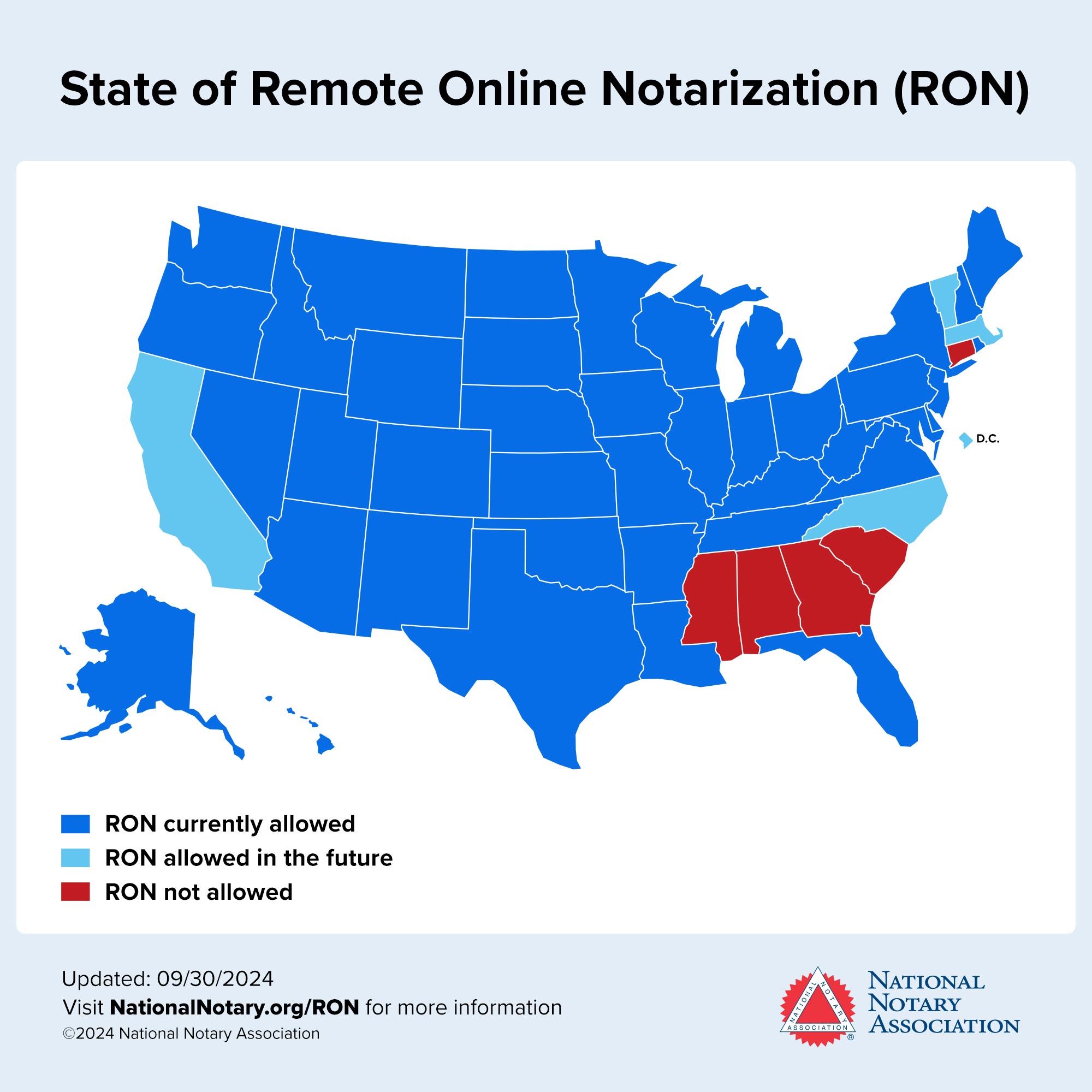Updated 9-4-24.
Editor's note: The NNA has received many calls from Notaries asking about Remote Online Notarization. Please refer to this frequently updated article for guidance first before calling. If you live in a state that has authorized the practice and has rules in place then you may perform remote notarizations. If your state has not authorized RON — or has authorized it but has not put rules in place — then you are not authorized to perform remote notarizations.
As more states pass laws authorizing remote online notarizations, the practice continues to raise questions among Notaries and signers alike. What is remote notarization? Where can it be performed? Who can request it? Can I perform it? What technology is needed?
COVID-19 UPDATE:
In response to the COVID-19 health emergency, a number of states issued emergency measures allowing Notaries to perform remote online notarizations during the crisis. However, most states have let these measures expire or have replaced them with permanent remote notarization laws. For more information and updates, see "States Take Emergency Action On Remote Notarization And Signers' ID."
Here are answers to the most common questions.
What is remote online notarization?
With remote online notarization, a signer personally appears before the Notary at the time of the notarization using audio-visual technology over the internet instead of being physically present in the same room. Remote online notarization is also called webcam notarization, online notarization or virtual notarization.
Is remote online notarization the same as electronic notarization?
Many people confuse electronic notarization with remote notarization, believing they are the same. They are not.
Electronic notarization, or eNotarization or in-person electronic notarization (IPEN), involves documents that are notarized in electronic form, and the Notary and document signer sign with an electronic signature. But all other elements of a traditional, paper notarization apply to electronic notarization, including the requirement for the signer to physically appear before the Notary.
The confusion arises from the fact that remote notarizations typically involve digital documents that are signed and notarized electronically. However they go a step further in that the transaction is conducted online rather than in person.
Where is remote online notarization authorized?
The map below shows the states that have enacted permanent RON statutes, states where permanent RON statutes have not yet taken effect, and states where RON is not authorized.
Note: Of the states where RON is not currently authorized, Alabama and Connecticut have enacted permanent remote notarization laws, but these laws aren’t technically considered RON laws. One of the distinguishing traits of RON is that it uses electronic documents and signatures. The Alabama and Connecticut laws allow remote notarization with paper documents only.
Will other states permit remote online notarizations in the future?
As other states enact remote online notarization laws, we will continue to update this FAQ.
How do I prepare for remote online notarization?
If you live in a state that has authorized remote online notarization, simply follow the requirements of your state. Select your state from the drop-down on this page to learn more about your state's remote Notary laws.
What technology will I need to perform remote online notarizations?
There are a number of technology companies that offer end-to-end remote online notarization systems. In practical terms, signing up with one or more of these companies will provide most online Notaries with the technology they need.
Each state that authorizes remote online notarizations may establish its own technology standards and requirements.
You can find all RON providers approved or listed by each state on Remote Online Notarization Platforms. Please note: Some states may not provide a list of approved vendors.
Will being a remote only Notary increase the value of the services I offer?
If you are a mobile Notary, adding services to your business offerings may increase your value, but it depends on the market need for RON and customers you serve.
How will clients know I am a remote online Notary?
Some remote online notarization platforms market their services directly to the public, so you don't have to. A couple of the companies also have apps in the Apple App Store and on Google Play. A person who needs to have a document remotely notarized downloads the app, pays the fee and is connected to a remote online Notary who can help them.
In these cases, companies function like mortgage loan signing services. Customers come to them for a loan closing assignment, and they schedule a remote online Notary through their system. Typically, when you sign up, platforms may ask you when you are available to perform remote online notarizations. You'll be paid a portion of the fee for the remote online notarization that the company collects from the signer through the app.
If you use a RON platform that doesn't market directly to the public, you will need to market yourself to potential clients just like you do today for paper notarizations.
Can I list that I perform remote online notarizations on my SigningAgent.com profile?
Yes. Every profile has an "Additional Information" section where you can put other qualifications and services. Go ahead and list it there.
Related Articles:
How to perform a remote online notarization
Remote notarization vs. traditional notarization
Additional Resources:
Model Notary Act of 2022
NNA Knowledge Center Remote Notarization Resources